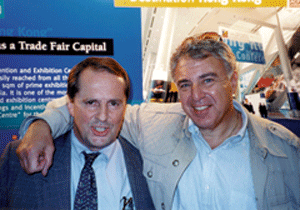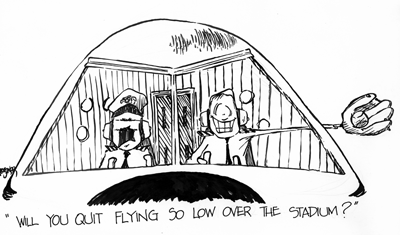Air Cargo Security Needs An Enlightened Approach
By Bill Boesch
(The former President of American Airlines Cargo recalls
a fateful day nearly 19 years ago that changed the way he thought about
the connections between his private world and the world at large, just
as 9/11 did for so many a little over a decade later. He also thinks that
the time is past for everyone to recognize the loss and sacrifice of others
by moving forward to a global, industry-driven initiative for air cargo
security).
“On Dec. 21, 1988, I was at a meeting in the
cargo conference room in the old American Airlines headquarters at DFW,
when we were interrupted by a message saying that a Pan American 747 had
crashed over the UK. Since I had only recently left Pan Am and knew many
of the people who worked there, I left the meeting to try to find out
what had happened and if I could be helpful in any way. Soon, the terrible
events of that day had become all too clear. A bomb had exploded in the
belly compartment of PAA Flight 103 shortly after it took off from Heathrow
Airport, killing 259 people on board and 11 people on the ground in the
village of Lockerbie, Scotland. At that moment, I realized that the air
cargo universe had shifted. It shifted because the explosive device had
not been carried on the aircraft by a passenger but had actually been
loaded in the belly as baggage.
After Lockerbie, governments around the
world started to look more closely at air cargo and baggage security.
The International Air Transport Association (IATA) also conducted endless
meetings and debates on the subject, in many of which I took part.
Over the years, as other events have unfolded—the first Iraq War,
the crash of TWA Flight 800, the horror of September 11, 2001, the “War
on Terrorism,” as the invasions of Afghanistan and Iraq in response
to 9/11, the Madrid subway bombings, and the UK terrorist plots, the debate
about what to do to increase the security of air cargo has continued.
Because the air cargo industry is so highly complex, with such an enormous
volume and diversity of “boxes” and people who touch them,
the question of security is equally complex.
The U.S. Government has worked hard to try
to balance all the obvious issues like the need to minimize the impact
of cargo restrictions on the balance of trade; the differing security
problems posed by freight traveling in passenger-aircraft bellies vs.
freight traveling in all-cargo aircraft; the effect of security costs
on passenger ticket prices and freight charges; the impact of regulations
on the competitiveness of U.S. carriers vs. foreign carriers; and the
impact of restrictions on the airlines’ precarious bottom lines.
And it has succeeded in implementing some necessary regulations. But the
number of people who are experts in air cargo is so few relative to the
fairly large number of people who are well versed in the ins and outs
of the passenger industry that getting all the right people together for
the amount of time necessary to come up with a comprehensive, acceptable
security strategy is very difficult. As American Airlines former CEO and
aviation visionary Robert Crandall once said at an IATA meeting, "Everyone
knows the passenger business because we are all passengers, but very few
of us know the air cargo business because we are not boxes."
The most recent travel scenario, in which
hapless travelers were forced to dump thousands of dollars’ worth
of perfumes, lipsticks, toothpaste, and aftershave, has only heightened
the impression that the security infrastructure and the airlines have
a long way to go to work together effectively. In the meantime, a blizzard
of rules and regulations, created as a result of what seems at times only
whims, are helping to drive the profit out of the airline business. From
my perspective, I believe that security would be better served if trade
and regulatory groups such as ATA, TIACA, and IATA were given the responsibility
for designing a realistic cargo security program, and a timeline for its
execution.
Today, 18 years after Lockerbie, IATA still
does not have global regulations in place to ensure cargo security. Governments,
and most noticeably the TSA in the United States, are still trying to
get a handle on the situation by hiring a few industry people, who then
attempt, with little success, to get industry-wide acceptance for improved
air cargo security initiatives. We need to put together “the best
of the best” from the air cargo industry (the passenger carriers,
the all-cargo carriers, the integrators, the freight forwarders, the customs
brokers, the shippers together with top government security experts) and
get them all to take full ownership of and responsibility for the situation,
and we need to impress upon them that they cannot walk away from the task
until a fail-safe solution is found and accepted by the governments with
a plan to put it into effect.
In short, my view is that the air cargo
establishment itself must develop and put into practice industry-wide
IATA security regulations, to be enforced in cooperation with the world’s
governments. By taking this action air cargo leaders will take the security
issue out of the hands of political and other special interests and the
responsibility for solving the problem will be shifted to those who have
the best chance to succeed. Technology has already given us ways to monitor
and track cargo that were unimaginable even a few years ago. The quality
of information we can provide customers has improved dramatically, and
getting that information to them has been given a very high priority.
Security from terrorist attacks should have an equally high priority.
There is also a compelling amount of information
available from past work that offers a foundation for the future. The
move toward better airline and air cargo security in America actually
began in the “pre-terrorist era.” In 1997, those of us who
were part of the Gore Commission on Aviation Security (chaired by former
United States Vice President Albert Gore) worked to build a consensus
for changes that would greatly enhance airline security. Although many
scenarios were discussed, very few of the Gore Commission recommendations
were adopted. Similar complaints are being voiced today about the recommendations
of the 9/11 Commission.
But the report that the Gore Committee produced still exists and has relevance.
It could easily be dusted off and reevaluated as part of the effort toward
a new beginning.
The one thing in my career I regret is that
I have been unable to influence the industry to take on the issue of cargo
security with the same urgency that it took on the problem of restricted
articles. Even in the aftermath of 9/11, the industry has not agreed on
practical, enforceable self-regulations and methods of operation to prevent
a terrorist attack involving air cargo. The future is truly in our hands.
The time for action is now.
Streetwise Cargo
 Bill
Boesch spent the last quarter of the 20th Century at the heart of air
cargo. Bill
Boesch spent the last quarter of the 20th Century at the heart of air
cargo.
As President of American Airlines Cargo
and Pan Am Clipper Cargo before that, Bill a native New Yorker, was one
of John Mahoney’s boys who emerged from legendary Seaboard World
Airways of the late 1960’s.
One thing for sure, when Bill Boesch was
around, ideas and imagination flowed.
Once at TIACA-Seattle in 1992, Boesch got
up on a stage and levitated a room full of hard-bitten cargo people, dropping
all pretense of open discussion, to push his newest idea for American.
It was 45 minutes of masterful Bill Boesch
and although memory fades as to just what the hell he was pitching, his
window on that group was a highlight of the conference.
Later when we beefed that his bit was not
about industry, but only about American, he said:
“Are you kidding?
“We operate thousands of daily flights,
and hundreds of airplanes all over the world.
“When American makes a move it is
a benchmark for everybody else, period.”
But we caught that kid-like grin Boesch
gave up for an instant as he spoke, and pressed him some more.
“C’mon,” we chided.
“That was a three quarter hour ad
for American.”
The response was classic:
“Well you know they do pay my way.
I have a responsibility to see to it that the greatest airline in the
world delivers, and that’s what I’ll do every time!”
Now it’s 2006.
Bill is in Washington D.C. or at home in
his beach house along the New Jersey shore or deep in the heart of Texas
at times.
 Children
are getting older. Children
are getting older.
He is on the board of some companies and makes no bones about a still
active life of air cargo behind the scenes, more with security issues
in Washington, a project to develop the C-17 cargolifter into commercial
application and his lifelong love of containers
“Air cargo needs leadership.
‘There do not seem to be enough people
willing to move on behalf of the industry.
Bill pictured at a TIACA gathering with friend and ex-Seaboard alumnus,
Vince Chabrol of World Trade Business.
“Right now with all these security
edicts emerging left and right, somebody or group within air cargo better
speak up, aside from just complaining, or the entire industry will reap
the whirlwind.
“I have been invited to trade shows
this year but you know after I get back I’m depressed for a month.
“All talk and no action.
“That’s not the way to better
air cargo. “Everybody has to give a little.
 “Not
for the power or influence, but for the good of the business.” “Not
for the power or influence, but for the good of the business.”
Bill Boesch always has had something to
say, worth the listen.
Even when every other breath was pitching
American, he would not be timid about leading or joining debate on any
topic to better the business.
Now, ‘retired’ Bill Boesch admits
that it’s the air cargo business that keeps him occupied, albeit
in a less public, behind the scenes way.
The summer of 2006 has ended and in New
York City Yankee Stadium soon will be empty. “Where have you gone
Joe DiMaggio?” is a plaintive refrain that means almost nothing
to the generation of today.
Bill Boesch has left centerfield in air
cargo, but he still has fire for the business.
It’s good to think, this genuine original
born in Air Cargo USA hasn’t left and gone away.
Contact: cargoman@attglobal.net.
(Geoffrey)
|



